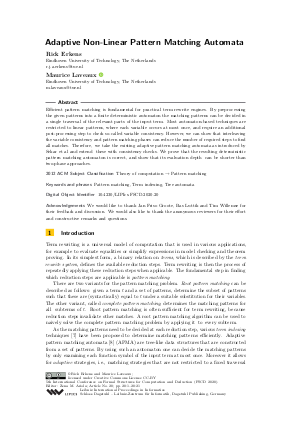Adaptive Non-Linear Pattern Matching Automata
Authors
Rick Erkens,
Maurice Laveaux 
-
Part of:
Volume:
5th International Conference on Formal Structures for Computation and Deduction (FSCD 2020)
Part of: Series: Leibniz International Proceedings in Informatics (LIPIcs)
Part of: Conference: Formal Structures for Computation and Deduction (FSCD) - License:
 Creative Commons Attribution 3.0 Unported license
Creative Commons Attribution 3.0 Unported license
- Publication Date: 2020-06-28
File

PDF
LIPIcs.FSCD.2020.20.pdf
- Filesize: 0.64 MB
- 21 pages
Document Identifiers
Subject Classification
ACM Subject Classification
- Theory of computation → Pattern matching
Keywords
- Pattern matching
- Term indexing
- Tree automata
Metrics
- Access Statistics
-
Total Accesses (updated on a weekly basis)
0PDF Downloads0Metadata Views
Abstract
Efficient pattern matching is fundamental for practical term rewrite engines. By preprocessing the given patterns into a finite deterministic automaton the matching patterns can be decided in a single traversal of the relevant parts of the input term. Most automaton-based techniques are restricted to linear patterns, where each variable occurs at most once, and require an additional post-processing step to check so-called variable consistency. However, we can show that interleaving the variable consistency and pattern matching phases can reduce the number of required steps to find a match all matches. Therefore, we take the existing adaptive pattern matching automata as introduced by Sekar et al and extend it these with consistency checks. We prove that the resulting deterministic pattern matching automaton is correct, and show that its evaluation depth is can be shorter than two-phase approaches.
Cite As Get BibTex
Rick Erkens and Maurice Laveaux. Adaptive Non-Linear Pattern Matching Automata. In 5th International Conference on Formal Structures for Computation and Deduction (FSCD 2020). Leibniz International Proceedings in Informatics (LIPIcs), Volume 167, pp. 20:1-20:21, Schloss Dagstuhl – Leibniz-Zentrum für Informatik (2020)
https://doi.org/10.4230/LIPIcs.FSCD.2020.20
BibTex
@InProceedings{erkens_et_al:LIPIcs.FSCD.2020.20,
author = {Erkens, Rick and Laveaux, Maurice},
title = {{Adaptive Non-Linear Pattern Matching Automata}},
booktitle = {5th International Conference on Formal Structures for Computation and Deduction (FSCD 2020)},
pages = {20:1--20:21},
series = {Leibniz International Proceedings in Informatics (LIPIcs)},
ISBN = {978-3-95977-155-9},
ISSN = {1868-8969},
year = {2020},
volume = {167},
editor = {Ariola, Zena M.},
publisher = {Schloss Dagstuhl -- Leibniz-Zentrum f{\"u}r Informatik},
address = {Dagstuhl, Germany},
URL = {https://drops.dagstuhl.de/entities/document/10.4230/LIPIcs.FSCD.2020.20},
URN = {urn:nbn:de:0030-drops-123427},
doi = {10.4230/LIPIcs.FSCD.2020.20},
annote = {Keywords: Pattern matching, Term indexing, Tree automata}
}
Author Details
Acknowledgements
We would like to thank Jan Friso Groote, Bas Luttik and Tim Willemse for their feedback and discussion. We would also like to thank the anonymous reviewers for their effort and constructive remarks and questions.
References
-
L. Cardelli. Compiling a functional language. In LISP and Functional Programming, pages 208-217. ACM, 1984.

- J. Christian. Flatterms, discrimination nets, and fast term rewriting. Journal of Automated Reasoning, 10(1):95-113, 1993. URL: https://doi.org/10.1007/BF00881866.
-
Fabrice Le Fessant and Luc Maranget. Optimizing pattern matching. In ICFP, pages 26-37. ACM, 2001.

-
Albert Gräf. Left-to-right tree pattern matching. In RTA, volume 488 of LNCS, pages 323-334. Springer, 1991.

-
P. Graf. Substitution tree indexing. In J. Hsiang, editor, Rewriting Techniques and Applications, pages 117-131, Berlin, Heidelberg, 1995. Springer Berlin Heidelberg.

- W. McCune. Experiments with discrimination-tree indexing and path indexing for term retrieval. Journal of Automated Reasoning, 9(2):147-167, October 1992. URL: https://doi.org/10.1007/BF00245458.
- R. Sekar, I.V. Ramakrishnan, and A. Voronkov. Chapter 26 - term indexing. In A. Robinson and A. Voronkov, editors, Handbook of Automated Reasoning, Handbook of Automated Reasoning, pages 1853-1964. North-Holland, Amsterdam, 2001. URL: https://doi.org/10.1016/B978-044450813-3/50028-X.
- R. C. Sekar, R. Ramesh, and I. V. Ramakrishnan. Adaptive pattern matching. SIAM Journal of Computing, 24(6):1207-1234, 1995. URL: https://doi.org/10.1137/S0097539793246252.
-
M. van Weerdenburg. An account of implementing applicative term rewriting. Electronic Notes in Theoretical Computer Science, 174(10):139-155, 2007.

-
A. Voronkov. The anatomy of vampire implementing bottom-up procedures with code trees. Journal of Automated Reasoning, 15(2):237-265, 1995.

